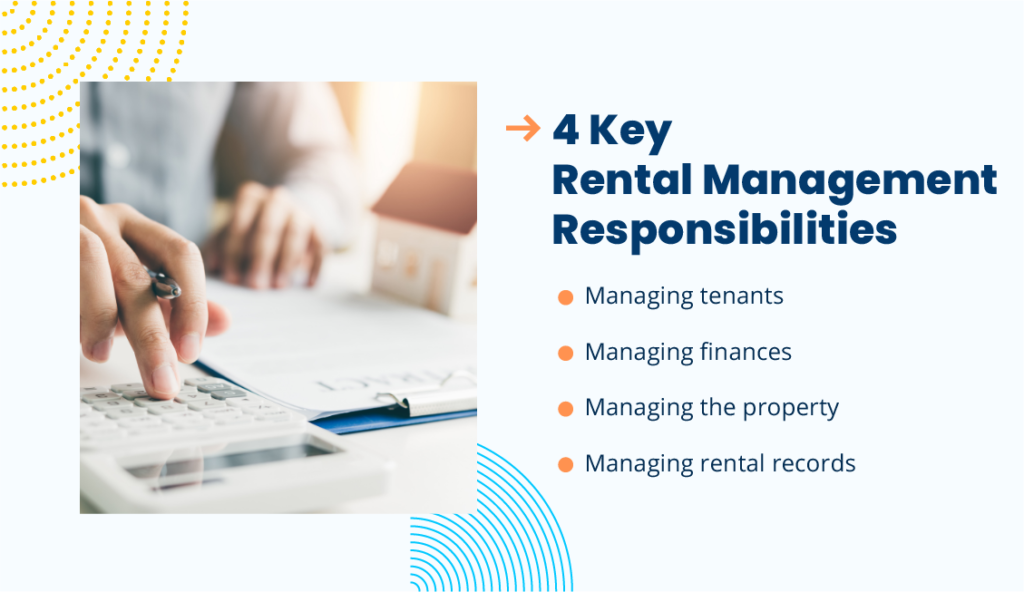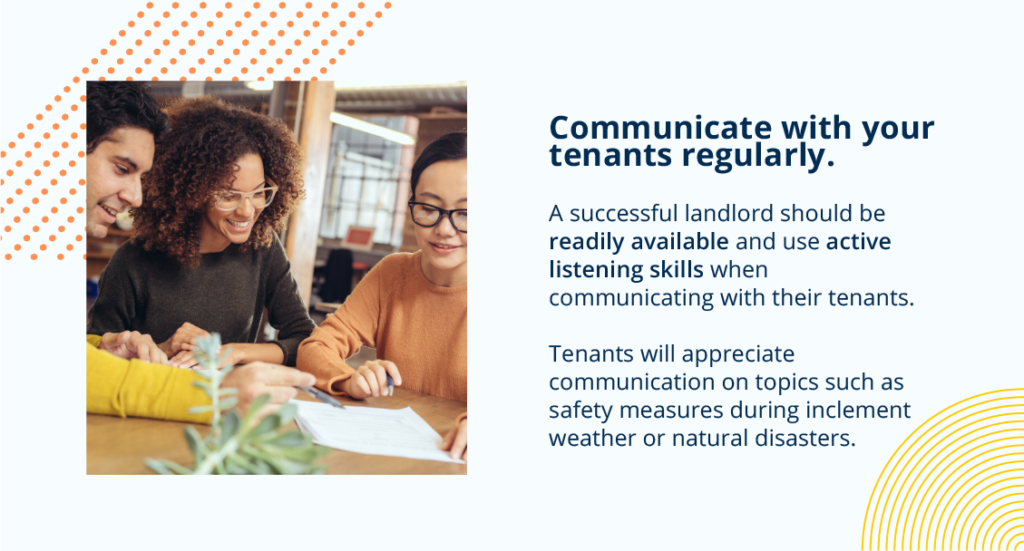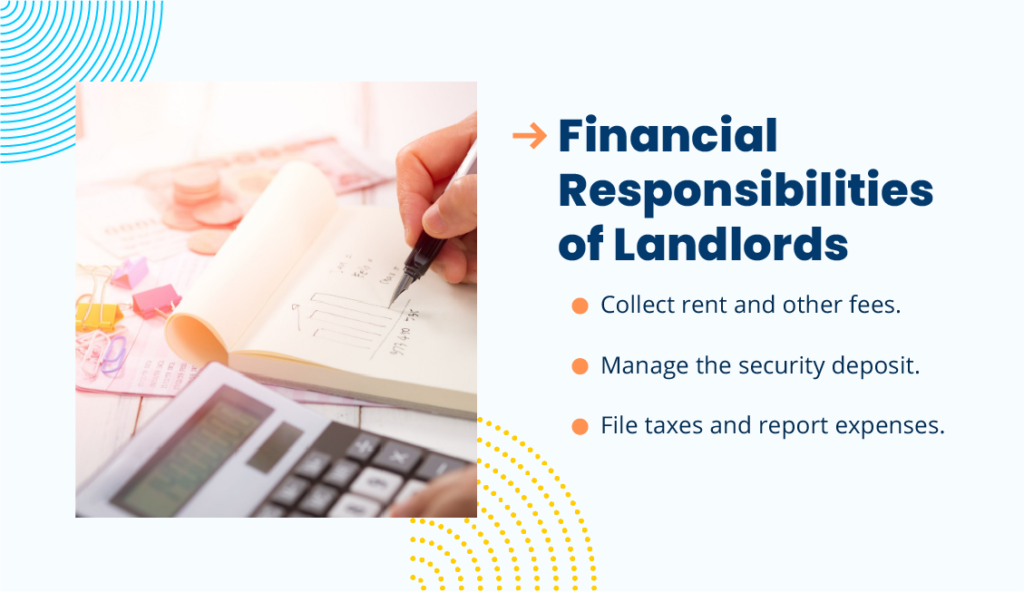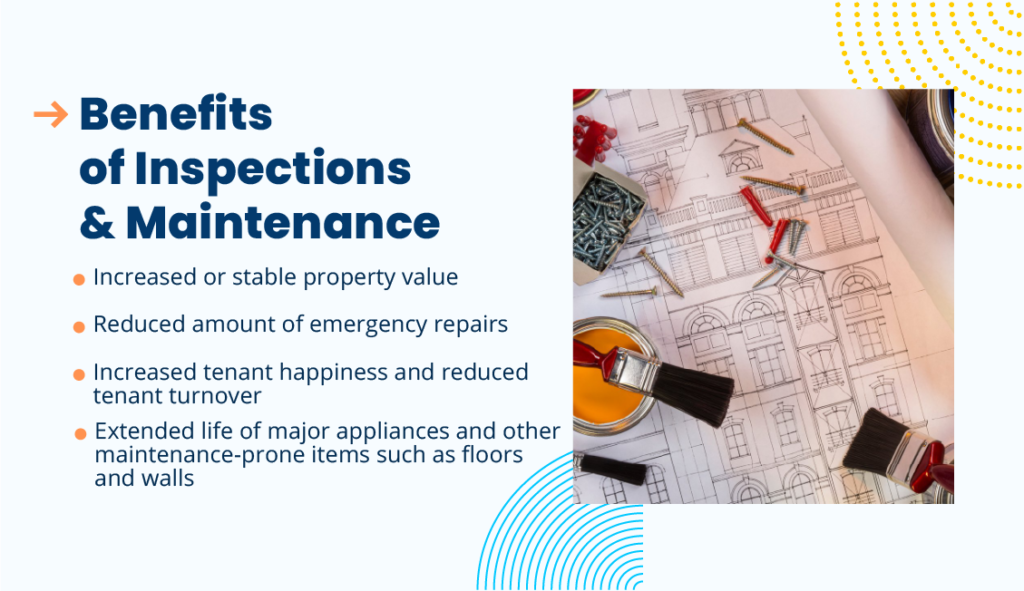How exciting! You successfully marketed your rental, screened a tenant, and signed your first lease agreement. While this portion of the rental process is an accomplishment in itself, managing a rental property is not a ‘set it and forget it’ type of business, and may not be as much of a “passive income” investment as you might have originally believed. Arguably, the most difficult aspects of managing a rental come after you have screened and secured a tenant.
Once a lease begins, most landlords know they will be required to communicate with tenants, collect rent and maintain the property, but these duties only skim the surface of a property manager’s responsibilities. Thankfully, rental property management does not require you to be a professional; however, it does require time, commitment and a small amount of skill. In this article, discover the top rental property management responsibilities and how to address them after the lease agreement is signed.
The 4 Key Rental Management Responsibilities

Rental management is the oversight of real estate properties either by a landlord or property management company and encompasses an array of day-to-day operations. Let’s take a high-level look at the operations required of landlords and property investors that occur after securing a tenant. There are four main areas of rental property management every landlord should be aware of:
Landlords that master these four categories of management can expect success with their investment.
Managing Tenants

Considering renters play a crucial role in your rental’s return on investment, managing your tenants may be the most important responsibility you will face as a landlord. Utilizing interpersonal skills is a guaranteed way to build and maintain great relationships with your tenants, but how does a landlord incorporate these skills into their landlording? Here are several recommendations:
- Communicate with your tenants regularly. A successful landlord should be readily available and use active listening skills when communicating with their tenants. Tenants will appreciate communication on topics such as safety measures during inclement weather or natural disasters, emergency contact information for urgent maintenance issues, and rent reminders. Pro-tip: Keep communication polite, professional, and friendly!
- Handle tenant complaints with care. Understanding and resolving common rental complaints is essential to your landlord-tenant relationship. Resolve complaints quickly, and after a complaint has been handled, follow up with the tenant, demonstrating genuine care for your tenant’s well-being.
- Respond to maintenance requests promptly. As a tenant, there’s nothing more frustrating than waiting eons on a maintenance issue to be fixed. To avoid upsetting your tenant, educate yourself on critical and non-critical repairs, along with state-specific landlord-tenant laws, and address maintenance issues quickly, prioritizing the most important repairs.
- Give notice. While landlords are legally required to give at least 24-hours (or more) notice before entering your rental, for many tenants, a Notice to Enter is a sign of respect. Additionally, the covenant of quiet enjoyment states that tenants have the right to peacefully utilize their rented space without undue interference from the landlord. This means no snooping, no showing up unannounced, and no harassmen
Managing Finances

Don’t be fooled – managing rental finances is not just collecting rent and paying your mortgage. There’s much more that goes into managing the financial side of your rental, so much so that do-it-yourself landlords essentially take on the role of an accountant. As intimidating as that may sound, it should not keep you from pursuing your property investment goals. To make managing money more digestible, here is an easy-to-follow breakdown of a landlord’s top three financial duties:
- Collecting rent and other fees: This responsibility is extremely important to most landlords, seeing that it’s where an investment property’s return on investment truly comes from. But, have you considered how you should collect payments from your tenants? Collecting rent and additional fees online through a property management system, like TurboTenant, will streamline your rental business as well as make it easier for your tenant to pay (and remember to pay) rent.
- Manage the security deposit: The security deposit should always be top of mind when tenants are moving out and when you’re inspecting the property. Ensure that you securely store the deposit during the renter’s lease, and then comply with return regulations. If you need to keep a portion or all of the security deposit to cover damages when a tenant moves out, inform your renter via a letter for damages.
- Filing taxes and reporting expenses: Potentially a landlord’s largest burden, filing taxes and reporting expenses accurately are important to your rental business success. Many landlords opt to use an accountant, but if you choose to file taxes on your own, make certain you take advantage of all eligible deductions. This will reduce your tax burden and boost your profits for the year! Don’t forget to track your expenses as you pay them to make taxes easier.
Additionally, landlords should always be prepared for expenses associated with running a rental. Such expenses could include utilities (if the tenant isn’t responsible for paying), home insurance, potential court fees, and of course, surprise maintenance issues. The more you account for, the more you’ll be ready to handle unexpected costs!
Managing the Property

Besides the fact that landlords are legally required to take care of repairs that make their rental uninhabitable, maintaining your property not only helps your tenant live a comfortable life, it also safeguards your investment. Performing routine inspections and taking care of subsequent maintenance are the two main duties of managing the property itself. Benefits of both include:
- Increased or stable property value
- Reduced amount of emergency repairs
- Increased tenant happiness and reduced tenant turnover
- Extended life of major appliances and other maintenance-prone items such as floors and walls
Routine inspections, performed when a tenant moves in or out and during their lease, help you identify if any big-ticket items have issues that tenants may not identify on their own. To make certain you know what to look for at each stage of the rental process, utilize these free rental inspection checklists. If you identify any maintenance issues, remember – don’t delay. Delaying maintenance can jeopardize both your landlord-tenant relationship and property value.
Renovations are not necessarily required for managing your property, but should always be a consideration especially if you’ve just purchased an older property, or intend to charge more for rent. Renovations will attract more renters, ensure your property stays competitive and increase your property’s value. They do not have to be time-consuming or expensive but can be as simple as adding a fresh coat of paint. For renovation inspiration, check out these 16 upgrades that won’t break the bank.
Managing Rental Records
Last but not least on the rental management journey is managing rental documents. Managing these documents will help you avoid potential liabilities and ensure you’re organized during the dreaded tax season. Take a look at what documents you should be concerned with and how to manage them appropriately:
- Store proof of property and landlord insurance. Both will protect your rental property from accidents and sudden loss, plus, help protect your financial assets in the event of a liability claim.
- Keep your lease agreement in a safe place. When it comes to settling disputes, if you don’t have a signed lease agreement readily available, it could be more difficult to make claims against your tenant. It’s best to keep both a physical copy of the lease stored away and have a digital copy saved in the Cloud someplace, such as in TurboTenant.
- Don’t throw away rental applications or rent receipts. Why? In the case that a tenant files a discrimination claim, rental applications serve as proof that you didn’t violate any Fair Housing laws when accepting or denying the tenant. Rent receipts serve as proof of payment, simplify rental property bookkeeping, and help minimize rent payment disputes.
- Document and store rental inspection checklists. Make a copy of rental inspection checklists for yourself and the tenant, so you can account for any new damage when their lease is up and it’s time to return their security deposit.
As you can see, a great deal of effort goes into managing a rental property after a lease starts, but with proper education and organization, landlords can successfully run a rental business from cycle after cycle. To make things easier on your landlord journey, utilize online property management tools like TurboTenant – an all-in-one solution that manages everything from marketing your rental and screening potential tenants to collecting rent and handling maintenance requests.







